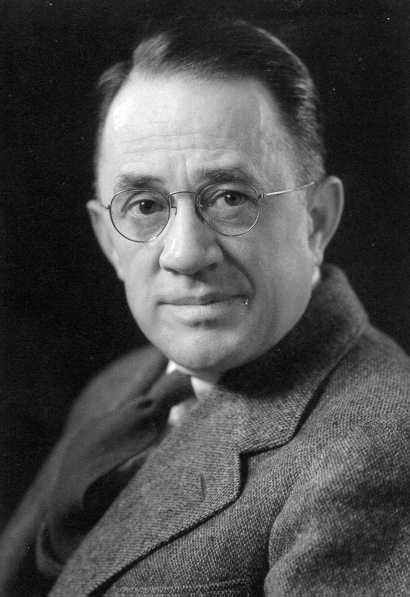
Leonard Slater Cottrell, Jr.
December 12, 1899 – March 20, 1985
Leonard S. Cottrell, Jr. served as the 40th President of the American Sociological Association. His Presidential Address, “Some Neglected Problems in Social Psychology,” was delivered on September 7, 1950 at the Association’s Annual Meeting in Denver, Colorado, and was later published in the December 1950 issue of the American Sociological Review (ASR, Vol 15 No 6, pp 705-712). Upon his death in 1985, the following obituary was published in Footnotes.
Obituary
Written by Nelson Foote, published in Footnotes, August 1985.
Some teachers leave as memorials of their passage through this world a series of students who through them found their vocations. Some thinkers by the influence of their formulations crystallized the views of many others. Some organizers of cooperative ventures gain remembrance as the builders of useful institutions. Leonard Cottrell played all those roles, and the products of his performance will be sustained for many years by his contributions to their development. Yet the least visible among his manifestations – the role of friend and sponsor – may be the most worthy of recollection and reiteration within his profession.
Born in Richmond, where his father was a journalist, he grew up on its outskirts in a family of five children. He graduated from Virginia Polytechnic in a pre-med course, but, sparked by religious associations and the student movement that followed World War I, he entered Vanderbilt in Nashville to earn a master’s degree in sociology. Stimulated by Walter Reckless, who taught sociology and criminolgy there, and by the legend beft by Robert Park at nearby Fisk, he then moved to Chicago. There, his major inspirations became Ernest Burgess in sociology and George Herbert Mead in philosophy. While making a living as a probation officer, he turned with Burgess toward applying to marital outcomes the methods that Burgess had developed for statistical prediction of success and failure of parole. Thenceforth his mind was engaged in trying to reconcile statistical probabilities with the struggles of persons to exercise some choice over the roles in which they will be cast. He had some faith that social psychology could enlighten this process.
Beginning his teaching career at Chicago, he went in 1935 to the Department of Rural Sociology at Cornell. There, he quickly attracted students from other colleges of the university. When Cornell presently ordained a sociology department in Arts and Sciences, he was named its first head.
Soon after Pearl Harbor, the War Department set up a Research Branch under Samuel Stouffer, a former fellow student and colleague at Chicago. He immediately recruited Cottrell to help organize surveys of the morale problems of people in uniform; these studies were ultimately reports in The American Soldier. After the war, it was back to Cornell to expand its department with several colleagues from the Research Branch then to be named Dean of Arts and Sciences. Again and again, his talent for earning trust and affection among colleagues caused his recuited into further responsibility. Peers and superiors, students and subordinates alike came easily to call him “Slats” (after his middle name). His whole-hearted attentiveness and respect for their work in progress made him seem more like a caring older brother than an administrator.
In 1950 he served as president of the American Sociological Society, the first year it met beyond the Mississippi (and was regaled by the first and only musical comedy about itself). A year later, Donald Young, with whom Cottrell had served on the board of the Social Science Research Council, persuaded him to leave Cornell to help reorient the Russell Sage Foundation from social work education to the broader application of social science to other professions and to public policy studies. There, Slats toiled for the next seventeen years as the gentle but stubbornly persistent sponsor and adviser of dozens of ventures on applied sociology, never despairing that academics could be found and prepared for the role of practitioner foreseen for them by Lester F. Ward, the founder and first president of the ASA. Much of the triumph of medical sociology traces back to hundreds of episodes of quiet consultation with beneficiaries of the Sage Foundation (and also of the National Institute of Mental Health, which Slats long served also as consultant). Slats confessed he found the legal profession a harder nut to crack than the medical but never halted his hammering.
All this while he kept his hand in teaching by leading a seminar and directing doctoral dissertations at New York University. After retiring from Sage in 1968 to return to his beloved South, he was to spend five years on the faculty of North Carolina at Chapel Hill – where he kept his home until he died on March 20. His wife, Anita, another Virginian, joined Slats in welcoming many to their hospitable hearth, nourished his enthusiasm for sailing and music, and above all shared with exquisite insight his delight in the feats and foibles of the human clan. They were a pair, but each distinctly a person.
Some of his faith that humanity could learn to take the role of the other dwindled as he watched the reckless stirrings of appetite for World War III. He gave unstintingly to efforts to prevent nuclear suicide and growled incessantly against the “lemmings who don’t know what they are asking for.”
Were Slats now applying for admission to some earthly institution, a bibliography and list of honors might be fitting. Were he himself looking backward, however, he would list the unfinished tasks he bequeaths to his professional heirs, among which the reconciliation of statistical generalization with personal development, and academic theory with practical application, loom as large as ever.
Nelson Foote, Hunter College